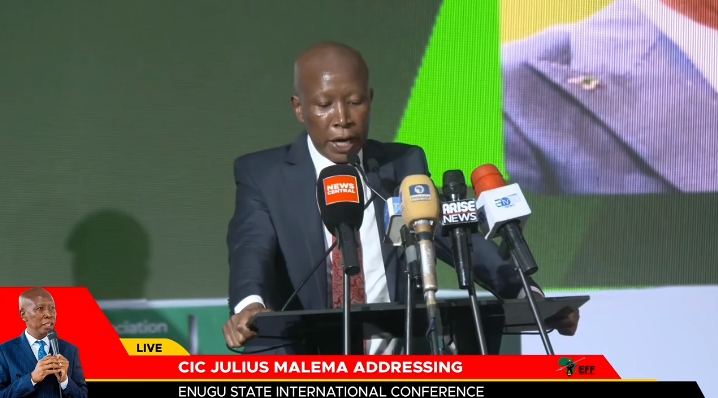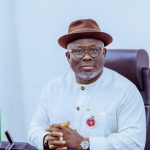President of South Africa’s Economic Freedom Fighters (EFF), Julius Malema, has said, the connection between the legal profession and the cause for liberation cannot be separated.
He said, “the link between the legal profession and the cause liberation cannot be separated.”
Malema made the statement while addressing the Nigerian Bar Association Annual General Conference on Sunday in Enugu.
Malema’s address posted on X by the Economic Freedom Fighters reads: “I further greet all Members of the Nigerian Bar Association who are present here today, representing the legal fraternity of this great country which remains a friend and ally of South Africa and her people.
“I am humbled that you saw it fit to invite me to give an address to the Annual General Conference, and by extension that you saw it necessary to invite the EFF to give this keynote address.
” I imagine it was not easy for a group of members of the law profession to reach consensus on who will address them, because your profession by nature is one of robust debate and contestation.
“Comrades and Friends, the link between the legal profession and the cause liberation cannot be separated, because just like us you are instruments of justice.
“While we wage our battle for freedom in the picket lines, through activism, protest and participation in governance – it is you the members of the legal profession who interpret the laws we make, who practice the justice we seek to achieve and who fight tirelessly for those who cannot defend themselves in the courts of law.
“It is a profession characterised by sacrifice, intellect and a commitment to interpretation of the past in order to achieve justice, fairness and victory in the present and the future.
“For the activists, we have history and dialectical materialism to guide us into leading society towards a better tomorrow, and for the legal profession you have indigenous law, common law, case law, the constitution and statutes, and objective reality to achieve not only personal victory but establish collectively, laws that will govern others for decades to come.
“Our duty however, and primary responsibility is not to maintain laws simply because they exist as they are today.
“Our duty is not to be instruments of injustice and neocolonialism, it is to be agents of change and this demands of us to be brave enough to identify unjust laws, speak out and form part of those that work tirelessly for our judiciary to be service to our people.
“I say this not to encourage anarchy and lawlessness, but to draw us back to the difficult truth and reality that at times the law has been used as a weapon of oppression.
“It has taken lawyers and activists to walk side by side, hand in hand to stand up against laws that perpetuate the undermining of the dignity of the people, and we must all be alive to this history and this possibility today.
“This becomes even more important for us as Africans, because for centuries our very existence has been unlawful in the eyes of the oppressor, our indigenous laws have been treated as inferior to Roman-Dutch law or the English law.
“To be an African has meant that for generations we are not worthy of the laws and rights that make us human beings, and for that reason it was legal to abuse us, to enslave us, to steal our mineral wealth and oil, and to destroy and kill our heritage, history and even our lives
“The legal profession you belong to, the political system we belong to, the judiciaries and parliaments we serve were created without us in mind. They were crafted at our exclusion and built to sustain our suffering. We now sit in the corridors which were built to break the back and the soul of African people.”



